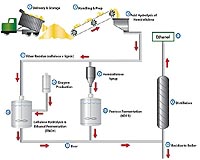 |
Kuala Lumpur (AFP) Nov 2, 2009 European palm oil buyers who are refusing to purchase expensive eco-friendly palm oil were named and shamed Monday by environmental campaigners WWF International. Only 10 out of the 59 major retailers and manufacturers surveyed in an industry scorecard have lived up to their commitments to buy "sustainable" palm oil which is manufactured according to strict standards, it said. At an industry conference in the Malaysian capital, WWF said that less than one-fifth of the 1.0 million tonnes of sustainable palm oil produced in the past year has been sold. "There are those companies which have shown it can be done," WWF International senior policy officer Adam Harrison told a press conference. "For everybody else we need to make sure the pressure is there and they follow through with action." Palm oil -- used extensively across the globe for biofuel, processed food and toiletries -- has been vilified by environmental campaigners for causing deforestation and threatening the survival of species such as orangutans. The Roundtable on Sustainable Palm Oil (RSPO) was formed in 2004 to establish stringent social and environmental criteria including a ban on clearing forests in order to plant the crop. But the WWF scorecard showed that while companies such as Sainsbury's and Marks & Spencer in Britain and Migros of Switzerland were meeting their pledges to use more expensive sustainable palm oil, others were not. Those on the bottom of the list included Danone of France and giant retailer Aldi. WWF said that 19 of the 59 companies scored between zero and three out of 29 possible points, "meaning that they have taken very little or no action to curb their use of non-certified palm oil". It urged the better-performing firms to move towards using 100 percent certified palm oil, and said that another review would be conducted in two years, eventually expanding to include palm oil buyers in other regions. "Many producers have been disappointed with the very slow offtake of certified sustainable palm oil," said Carl Bek-Nielsen from United Plantations, one of the best-regarded operations in Malaysia. He said that just five percent of its certified production had been sold as sustainable, with the small premium it attracts. "Before RSPO palm became available, there were many people who were screaming and shouting for RSPO palm. When it became available, most of these big buyers just disappeared out the door like greased lightening," he told AFP. "They have let the producers down in a way. They have asked us to go ahead and produce this thing and live up to these very stringent criteria -- the strictest for any agricultural crop." Bek-Nielsen said the industry reluctance had "cost us a lot of money" but that the WWF scorecard was a landmark in raising awareness, and he was hopeful things would now improve. WWF also said it was heartened by pledges from dozens of companies to lift their use of sustainable palm oil. "The commitment is there, we know those volumes will come in over the next three or four years," Harrison said. "The number of phone calls enquiring about certified palm oil is increasing. There is a lot of optimism that it's going to rebalance itself." Malaysia is the world's second-largest exporter of palm oil after Indonesia, and the industry is the country's third largest export earner, raking in 65.2 billion ringgit (19 billion dollars) last year. Share This Article With Planet Earth
Related Links Bio Fuel Technology and Application News
 Verenium And VPP Test C5 Cellulosic Technology On Pulping Feedstocks
Verenium And VPP Test C5 Cellulosic Technology On Pulping FeedstocksCambridge MA (SPX) Nov 02, 2009 Verenium has announced that it has entered into an agreement with Value Prior to Pulping (VPP) to test the effectiveness of Verenium's C5 technology for the creation of cellulosic ethanol from the hemicelluloses generated by the pulp and paper process, creating higher value products without negatively impacting paper quality. VPP is funded by the U.S. Department of Energy (DOE), the State ... read more |
|
| The content herein, unless otherwise known to be public domain, are Copyright 1995-2009 - SpaceDaily. AFP and UPI Wire Stories are copyright Agence France-Presse and United Press International. ESA Portal Reports are copyright European Space Agency. All NASA sourced material is public domain. Additional copyrights may apply in whole or part to other bona fide parties. Advertising does not imply endorsement,agreement or approval of any opinions, statements or information provided by SpaceDaily on any Web page published or hosted by SpaceDaily. Privacy Statement |